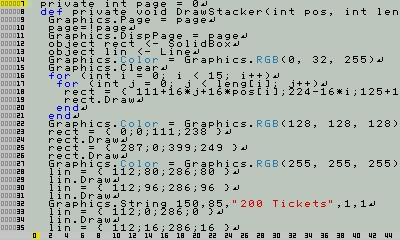This looks really neat. Are there more code examples?
Instructions:
[N# manual has not been published] 1: Set PRG:N_SHARP as your SmileTool. 2: Write your N# program in slot 0 of the editor. 3: When you're ready to compile, press the Smile button. Your program will compile and will appear in slot 1 of the editor. This new PRG file is in pure SB, so it can be loaded, saved, and published independent of any N# tools. N# "Hello World" example:use "Console" static class entry def public void main() Console.Println "Hello World!" end end staticAs this is Beta, there are a few glitches I am aware of. However, almost all of these are crunched, and so the development should hopefully come out of beta soon. Update List: Beta v1.0: *Original publication Beta v1.1: *Private functions *Changed array declaration syntax *Fixed calculator example *Bug fixes Beta 1.2 *Revamped objects *Assigning objects class references *Bug fixes Beta 1.3 *Library importing *Completed object functionality *MML and Graphics classes *Class variables (private keyword doesn't work yet with these) *Passing an object's value as a parameter works now *Inline SB editor using [SB] tag in front of a line *Bug fixes Beta 1.4 * += and -= operators to work on objects * /=, %=, *=, <<=, and >>= operators added * % instead of MOD *Console and Hardware class *Class variables *Immutable value types *Foreach blocks *Basic array comprehension using [| and |] *Compile code to a standalone PRG! (No more mandatory runtime compilation) *Bug fixes Beta 1.5 *Changed syntax of switch blocks ("end" is no longer required after each case, only at the very end) *Changed compilation process of +=, -=, *=, /=, %=, <<=, and >>= (this does not affect the user) *Removed runtime compiler *Added progress bar to compilation *Removed support for labels *Partial sprite library *App library *Resource library *Bug fixes Beta 1.6 *By reference parameter passing *Brace syntax *Dictionary library *Wildcard variable (equal to anything) *Runs as SmileTool (much easier to use) *Ignore command *Lambdas and higher-order functions *Bug Fixes Beta 1.7 *Getter functions *Setter functions *Init functions *Modified Sprite and MML classes Beta 1.8 *Lazy evaluation *eval() function *BigInt library Expected Updates: Beta 1.9 *Completed Sprite Library *Function overloading *Bug Fixes
